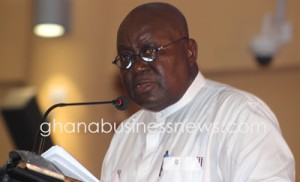
The presidential candidate of the opposition New Patriotic Party (NPP) Nana Addo Dankwa Akufo-Addo has asked President John Mahama whether he is living in the same Ghana as the rest of the Ghanaian populace.
Delivering The True State of the Nation Address – the NPP’s riposte to President Mahama’s state of the nation address last Thursday, February 25 – Nana Akufo-Addo said President Mahama appeared to be out of touch with the country he was governing and his state of the nation address was a sad spectacle of propaganda that did a great disservice to the image of parliament.
“It is disrespectful to the people of Ghana and to our republican institutions for the president to exhibit such a cavalier attitude to facts, in a formal address to the nation”, Nana Addo said.
He noted that critical issues such as high youth unemployment, the water shortages that have hit several parts of the country recently, and the Interception of Postal Packets and Telecommunication Messages Bill, were left untouched.
The NPP flag bearer said while he waited along with many Ghanaians during the address for an admission by President John Mahama that the nation was going through a crisis, that admission never came and the president instead chose to tell a tale of two Ghanas: one inhabited by the president, his family, friends and a select few, and the other harsh one inhabited by the rest of Ghanaians.
“President Mahama painted a picture that bore variable resemblance to the reality that is today’s Ghana. We have made cocoa farming attractive. NHIS [National Health Insurance Scheme] is flourishing. He has overcome the energy crisis.
“Really? Mr President, are you living in the same Ghana as the rest of us?” Nana Addo asked rhetorically.
The NPP flag bearer further questioned what he said was the one-sidedness of the president’s “theatrical show” in parliament by inviting certain citizens to support his narrative.
To attest to gains made under his leadership, President Mahama invited to parliament during his address, beneficiaries of his government’s Changing Lives agenda: ordinary citizens whose lives had been transformed by the government.
But the NPP flag bearer said the invited guests excluded other types of beneficiaries such as those who have profited from corruption.
“The president also omitted an important group of beneficiaries of his government over the last eight years. These include Alfred Woyome and other beneficiaries of the create, loot and share judgement debts we gave, beneficiaries of the looting of the SADA guinea fowl and tree planting exercise, the beneficiaries of the looting of the GYEEDA scheme and the beneficiaries of the looting of the Smartyys bus rebranding scheme.
Why did the President fail to bring these people to parliament?” Nana Addo asked again.
The true state of the nation
Concerning the reality on the ground, Nana Addo said there was systematic plundering of state resources amidst a devastated economic landscape challenging businesses and forcing layoffs.
He highlighted among other things, the high spate of single source procurement by the government, high youth unemployment, arrears in teachers’ salaries, the elimination of teacher and nursing trainee allowances, under-resourced health facilities, high interest rates, stagnation and decline in agriculture and industry, high utility tariffs and taxes, a collapsing national health insurance scheme, “reckless borrowing” and unsustainable debt.
The government’s fight against corruption he said, was “a sham” and despite President Mahama’s explanations of the paradox of exposure, corruption in his government has always been exposed by the media, civil society and the minority.
He further accused government of inflating the costs of infrastructure projects such as the Ridge Hospital, adding that only 20 per cent of $37 billion borrowed in seven years by the NDC, had been used for infrastructure, and Ghanaians have a right to expect four to five times more than the infrastructure projects currently being executed.
By Emmanuel Odonkor
